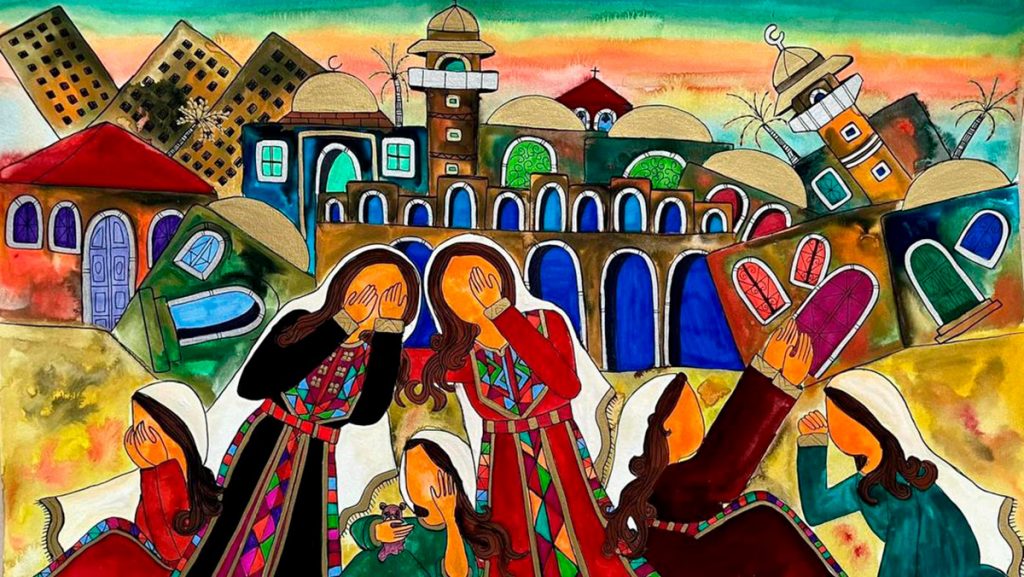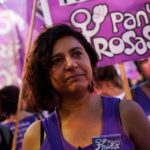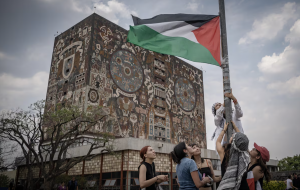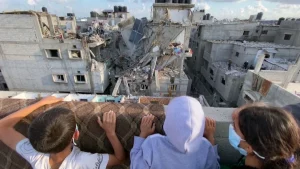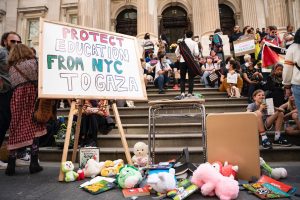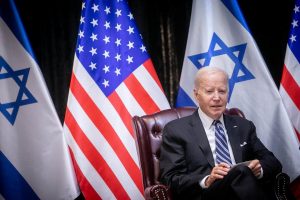According to the United Nations, 788,800 women, girls, and boys in Gaza have been displaced from their homes; 2,056 women have become widows and have become the sole heads of households; 7,401 girls, boys, and adolescents have lost both of their parents; 50,000 women are pregnant, and 5,522 of these women have a due date in the next month.
The colonialist occupation of the State of Israel and the current bombings and displacements only exacerbate the situation of Palestinian women who already face living in a society with strong patriarchal traits. The women’s movement in Palestine had already been fighting for their rights in their own society and culture and in the very harsh context of apartheid supported by Israel. Today the situation is catastrophic.
According to Addameer, which is a Palestinian Human Rights organization, in the last fifty years around 10,000 women have been arrested or detained and the majority are subjected to specific attacks in relation to their gender that include insults, threats, humiliating body searches, and even sexual abuse and other forms of torture. For the most part, like men in the same circumstances, these detentions are carried out as “administrative detentions,” which allows the Israeli military to hold prisoners indefinitely on secret information without charging them or allowing them to stand trial. This situation can be sustained for a period of six months, after which the arrest can be renewed for an indeterminate number of times.
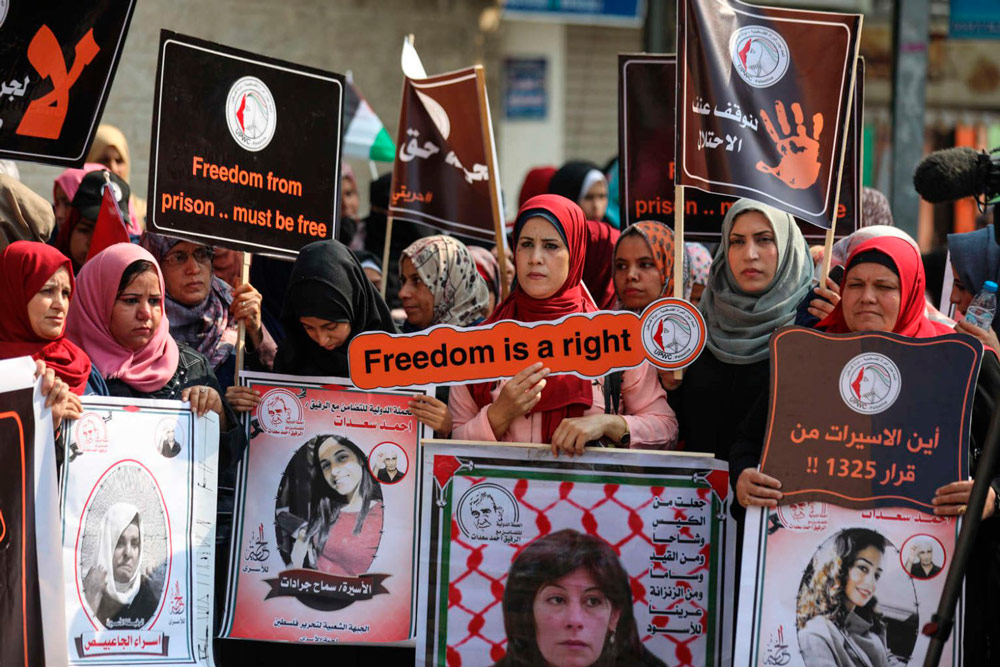
Remember Their Names: The Personal Stories of Dehumanization at the Hands of the Colonizers
If the numbers alone aren’t terrifying enough, the first-person accounts are even more moving. “The nights in Gaza have become an endless nightmare. Sleep is a luxury we cannot afford and death lurks around every corner,” says Nourhan, who participates in a youth forum for civil rights in the Palestinian territory. She is a lawyer, she is 29 years old, and she refused to leave her house until all the houses around her were destroyed by the bombings. It was then that she sought refuge in her parents’ home. But a few days later, she also had to flee during the night, in the middle of an air raid, with her entire family. “Survival is only the first step,” says Nourhan, because she is convinced that “the scars of war would persist long after the Israeli airstrikes stop.”
Nourhan’s story is like any other in Gaza. Perhaps there are stories that are even more horrifying. Nourhan has a face, a name, some personal anecdotes that must be reconstructed, imagined, disseminated to combat the dehumanization of the Palestinian people that the Zionist State undertakes to perpetrate genocide without scruples. It is necessary to tell more stories and remember more actual names.
What is the memory of the occupied territory, of the people subjected to colonization, of those who lost the battles, of those who were displaced, eliminated, silenced, of those who do not even have the right to exist in the founding story of the State of Israel? It is the memory preserved and talked about from generation to generation, in the streets, within diaspora families, among survivors and refugees, and even in poetry.
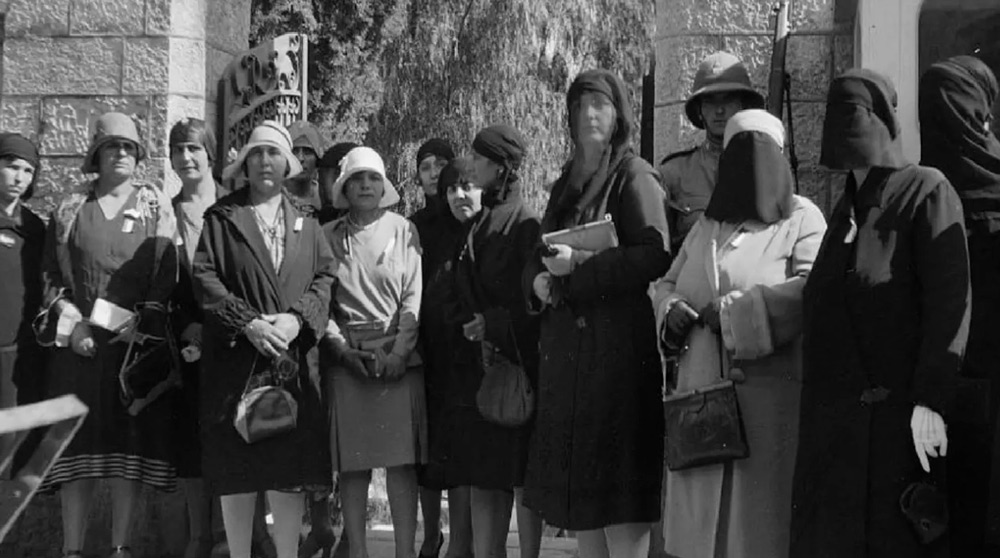
The Exiled, Tortured, and Murdered Poets Who Sing for Freedom
Rafeef Ziadah, a Palestinian poet born in a refugee camp in Lebanon wrote:
I am three generations of mending tents and homes. / Of picking up and starting again. Suitcases and keys./ To save the leftovers because the siege looms over us and always arrives./ To sleep on airport floors./ To memorize the Immigration questions and the maps.
Her family, originally from Haifa and Jaffa, was massacred and displaced during the Nakba of 1948. As refugees in Lebanon, they had to flee again when Israel invaded the country in 1982. After living in different places in the Mediterranean region, Rafeef settled in the United States and Canada. She currently resides in Great Britain. Rafeef’s story is surely replicated by thousands of others, with other names, and other words.
But poets are not immune from torture and death either. In October 2015, poet and activist Dareen Tatour was jailed for writing a poem that went viral. She remained under house arrest until 2018, after which she was sentenced to five months in jail and six months of probation for “incitement to violence.” Her poem said:
In Jerusalem, I dressed in my wounds and inhaled my own pain, / I carried the soul of this Palestinian Arab in the palm of my hand. / I will not succumb to the supposed “peaceful solution” / I will not abandon this fight / until I drive them out of my land./ They will have no escape./ Resist, my people, we have to resist them.
In one of the first bombings of this new escalation in Gaza, the Palestinian feminist writer Heba Abu died. On October 21 she had posted a message that said: “If we die, know that we are satisfied and firm. And tell the world, in our name, that we are just people, on the side of truth.” That same day, shortly before the news of her murder became known, she had written her last poem:
The night in the city is dark/except for the glow of missiles/ silent,/ except for the sound of bombing/terrifying,/except for the reassuring promise of prayer/ black,/ except for the light of the martyrs./ Good night.
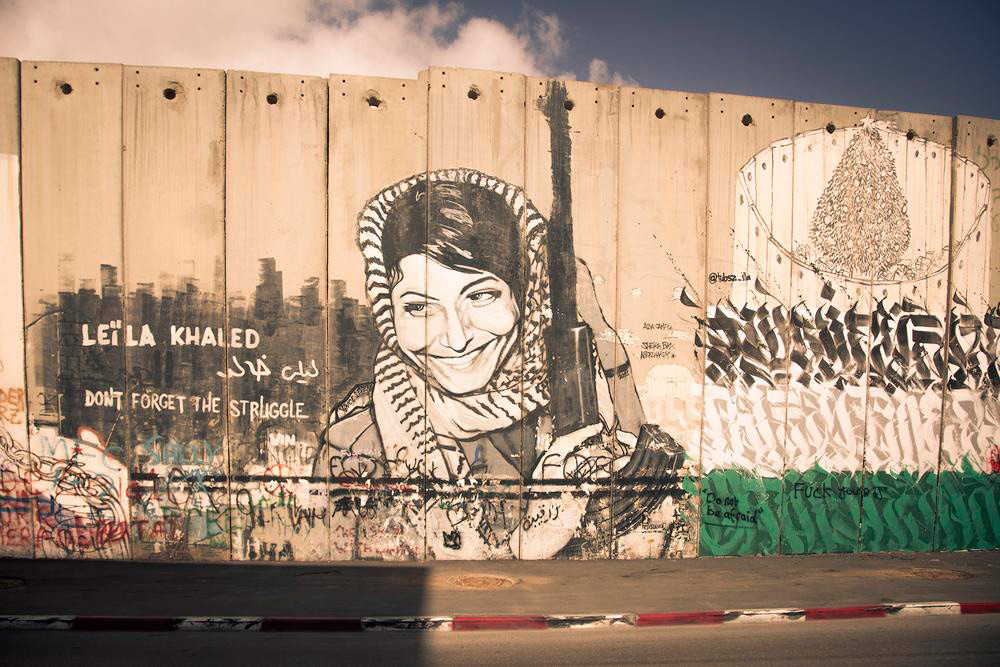
A Women’s Movement That Fights on Several Fronts
In 1920, three years after the writing of the Balfour Declaration, Muslim, Christian and secular women organized to protest against this treaty. 1The Balfour Declaration, of November 2, 1917, was the British government’s support for the establishment of a “national home for the Jewish people” in the region of Palestine, which, at that time, was a territory that was part of the Ottoman Empire. In 1929 they held a congress of Arab Women of Palestine. And even before the creation of the State of Israel, they founded a clandestine organization that transported weapons and supplies to the rebels. In 1936 there was even a general strike in which women mobilized against British colonialism that was driving Israeli migration to Palestine. In the 1960s, a new generation chose the path of armed struggle. Of this Palestinian youth, perhaps the best known internationally is Leila Khaled of the Popular Front for the Liberation of Palestine, whose image achieved great popularity when in 1969 she hijacked a plane heading from Rome to Tel Aviv, diverting it to Damascus, where it was blown up after all its passengers were evacuated without suffering damage. A year later, after several surgeries to modify her appearance, she participated in another similar operation that was thwarted by Israeli security forces.
In the 1980s, the unavoidable debate in the women’s movement was between the options of fighting for their civil rights and gender equality or facing the occupation and apartheid of Israeli colonialist policy. However, these disputes were resolved in practice. During the first Intifada, women participated in the rear and also fought against the Israeli military forces. In some way, the fight against national oppression is a space of freedom for those who also face patriarchal oppression. The women’s movement gains more visibility, mobilizations are organized for their own demands, and legislative proposals are made in favor of women. But towards the end of the decade, the strengthening of Islamic fundamentalism represents a break in the development of the women’s movement. In the second Intifada, the participation of women was reduced. While Israel detains many Palestinian men to pressure the combatants and intimidate the population, that in turn reinforces the control over their own families with the excuse of protection.
But Palestine has not been left out of the recent mobilizations of women against sexist violence that spread across the world from the #NiUnaMenos movement in Argentina to the #YoSíTeCreo of the Spanish State. In 2019, the brutal femicide of the young Israa Ghrayeb, in the West Bank, sparked a wave of mobilizations. 2Israa had fallen from the second floor of her family home, escaping from the beating from her brother for posting a photo on Instagram with her partner, whom she would marry the following day. Seriously injured, from the hospital where she was hospitalized, she again published on social networks “I am strong and I want to live”, to which several men in the family reacted by beating her again in the same place where she was hospitalized until, finally, she died, because of the injuries. Thousands of Palestinian women, as well as those from other Arab countries, shouted in the streets against oppressive cultural mandates, chanting “There is no liberated homeland without the liberation of women” and “We are all Israa”
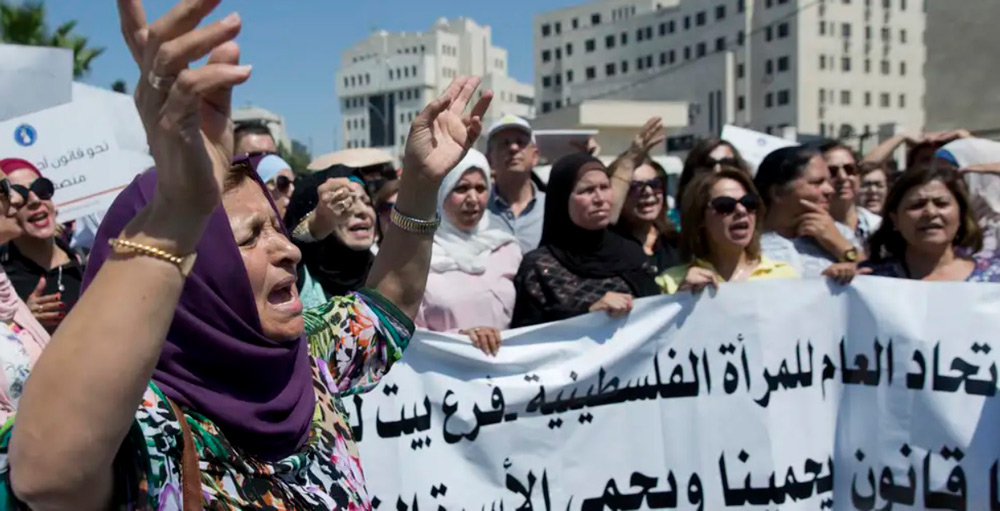
Ending the Genocide in Gaza Is Also a Feminist Issue
Those of us who fight against all forms of oppression and exploitation, convinced that we must put an end to the atrocities of capitalism, patriarchy, racism and colonialism, are not alien to the fight for survival that the subjected Palestinian people are waging today against the genocide of the State of Israel.
On social networks, feminists who speak out in solidarity with Palestine, receive insults, grievances and threats from anti-rights, conservative and far-right sectors who mock when they find the word “feminism” linked to the struggle of a people which is usually reduced exclusively to some of their armed organizations and theocratic political parties – with which we do not agree – that are deeply reactionary with regard to the life and rights of women. Furthermore, the persecution and criminalization perpetrated by Zionism against any manifestation of support for the Palestinian cause is the order of the day: from censorship and smear campaigns to trials, police repression and arrests.
But none of that can stop millions of Jewish and non-Jewish people, who are rising up around the world to embrace Palestine, shouting “not in my name,” “ceasefire now,” “stop the genocide in Gaza.” And among those millions of people, we feminists want our voices to be heard on November 25, because genocide is the most brutal form of violence against women. 3Follow the news about the calls in Argentina on Instagram @panyrosasargentina. The people born from its womb are facing elimination by the brutal force of the Israeli colonialist state, armed to the teeth by North American imperialism and sponsored by the European Union. But women will continue to give birth to new generations who will “mend tents and homes” until the land that belongs to them, from the river to the sea, is free again.
Today, those of us who can afford to sleep want to awaken all our strength to say, in the streets of all the cities of the world, “Enough!”
Article translated from La Izquierda Diario by Isabel Ros López
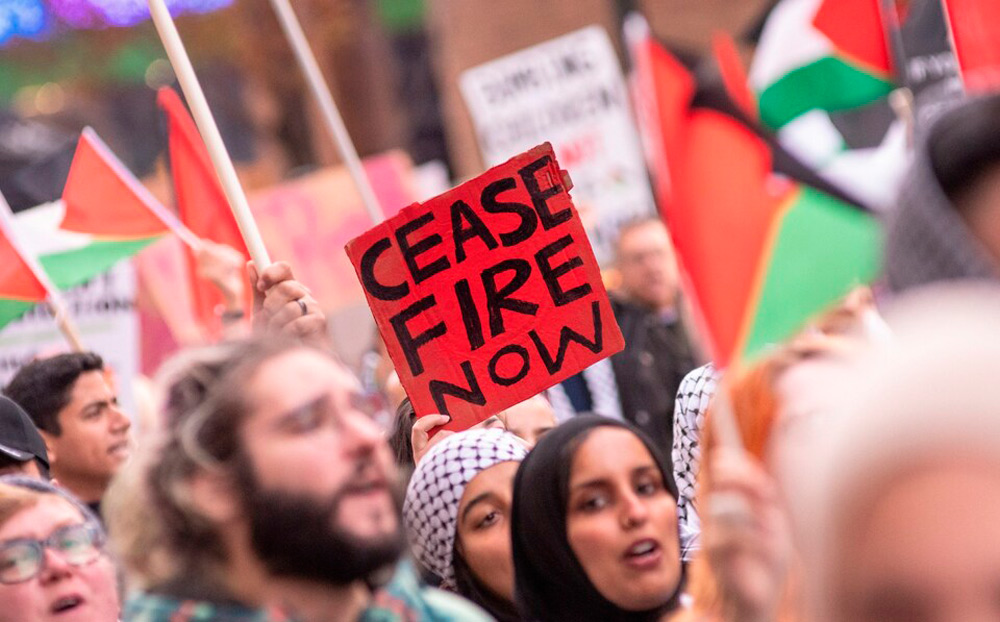
Notes
| ↑1 | The Balfour Declaration, of November 2, 1917, was the British government’s support for the establishment of a “national home for the Jewish people” in the region of Palestine, which, at that time, was a territory that was part of the Ottoman Empire. |
|---|---|
| ↑2 | Israa had fallen from the second floor of her family home, escaping from the beating from her brother for posting a photo on Instagram with her partner, whom she would marry the following day. Seriously injured, from the hospital where she was hospitalized, she again published on social networks “I am strong and I want to live”, to which several men in the family reacted by beating her again in the same place where she was hospitalized until, finally, she died, because of the injuries. |
| ↑3 | Follow the news about the calls in Argentina on Instagram @panyrosasargentina. |


